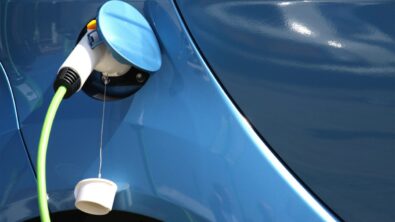Exploring the impact of sustainability on the automotive industry

Industries around the world are reckoning with their ecological impact and placing heightened focus on improving their sustainability performance. This sustainable movement is driven by a combination of factors, including increased climate risks, emerging regulations and a growing consumer preference for greener products. Amidst this global trend, the automotive industry finds itself at a pivotal moment, where it must adapt to align with the principles of an eco-friendly future.
In a recent podcast, Nand Kochhar, VP of Automotive and Transportation Industry at Siemens Digital Industries Software and Eryn Devola, Head of Sustainability at Siemens Digital Industries met to discuss how sustainability is influencing the automotive industry. Their conversation highlights the importance of partnerships, electric vehicles (EVs), the integration of data and the role of digitalization—all contributing to the automotive industry’s ability to achieve future success and satisfy sustainability standards.
Partnerships and collaborations
The evolving landscape of sustainability requires a critical examination of strategies, partnerships and collaborative efforts to address environmental challenges and drive change. Regulations like the Paris Agreement are holding organizations accountable for their emissions. What has become clear is that automakers can’t meet these criteria alone.
Given the dynamism of the sustainability field, there is a lack of standardized language, definitions and common calculation methods. While this communication barrier has made it difficult to measure the environmental impacts in the industry, it has demonstrated the immense importance of industrial partnerships. For example, the Catena-X Automotive Network project, has created a collaborative open data ecosystem for the automotive industry, designed to promote cooperation between partners and suppliers that will enhance their value chains. Moreover, Catena-X presents a space for members of the industry to establish industry-specific norms and guidelines, thereby laying the foundation for a shared framework.
However, the significance of partnerships doesn’t end there. Progressing along the value chain, these collaborations prove indispensable in uncovering the environmental impacts associated with automotive manufacturing and distribution. From supply chains to distributors, dealers and end customers, a transparent understanding of the entire product lifecycle is crucial. This is where the power of partnerships shine, creating a network of industry professionals working collaboratively to share data and insights to discover where sustainability can be improved.
Autonomous vehicle data
Autonomous vehicles (AVs) will certainly play a significant role in creating a greener future for automotive and transportation. Beyond reducing emissions, AVs will offer a unique opportunity to optimize performance through the collection of data in the form of both driver and traffic behaviors. Equipped with advanced sensing technologies and data capture abilities, AVs on the road will constantly learn from the environment around them. They will take into account factors like optimal speed, road conditions and fuel efficiency, which reduces overall energy consumption.
In addition, AVs have the potential to reduce accidents through cameras, sensors and AI-driven decision-making. Fewer accidents mean fewer damaged vehicles, leading to fewer resources used for repairs and replacements. Armed with these empirical insights, engineers can leverage this data to refine future vehicle designs, ensuring they operate more eco-consciously.
The “how” supporting the “why”
Considering evolving sustainability targets, how can automotive companies produce innovative yet environmentally friendly products? The answer: through digitalization. By becoming a digital enterprise and employing technologies like the Internet of Things (IoT), the digital twin and data, engineers and manufacturers can meticulously monitor and optimize every aspect of their operations. For instance, the digital twin allows engineers to experiment with designs, pinpointing areas for refinement without wasting physical resources. This leads to benefits such as:
- Cost savings
- Improved production processes
- Reduced energy consumption
Additionally, this digital approach facilitates targeted improvements across the whole production cycle, reducing environmental impact.
Digitalization is also instrumental in helping automotive companies adhere to environmental regulations. Having access to data insights from the design phase to the supply chain and use phase presents an opportunity to draw connections, resulting in a holistic view of a company’s operations. This collective intelligence enables companies to make informed decisions, identifying areas of improvement and fostering collaboration with like-minded supply chain partners.
The strength of digitalization ultimately lies in its ability to connect the dots across the automotive production spectrum, facilitating continuous improvement and propelling the industry towards a sustainable future.
Siemens Digital Industries Software helps organizations of all sizes digitally transform using software, hardware and services from the Siemens Xcelerator business platform. Siemens’ software and the comprehensive digital twin enable companies to optimize their design, engineering and manufacturing processes to turn today’s ideas into the sustainable products of the future. From chips to entire systems, from product to process, across all industries. Siemens Digital Industries Software – Accelerating transformation.


